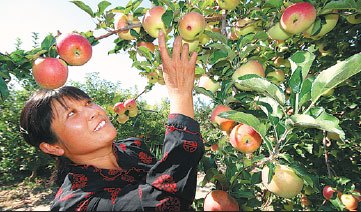
A farmer picks apples at an orchard in the Xinjiang Uygur autonomous region. Wang Tiesuo / China News Service File Photo
A documentary broadcast on Monday traces the origins of the apple to the Xinjiang Uygur autonomous region, quashing the popularly held Chinese belief that they were introduced to the country from the West.
The documentary, "Saving the Gene Pool", draws on a multitude of scientific evidence to show that all cultivated apple varieties are offshoots of Malus sieversii, a wild apple native to the Tianshan mountain range in Central Asia.
Many Chinese attribute the introduction of the apple to China by John Livingston Nevius (1829-93), a US Christian missionary. Livingstone and his wife were said to have brought apple seedlings with them to Yantai, Shandong province, now a major apple growing region.
The documentary team also tested a wild apple tree in the Ili Kazak autonomous prefecture in Xinjiang. The 12.9-meter tree is believed to be over 600 years old, predating the supposed introduction of apples to China by a few hundred years.
The sequencing of the apple genome by Italian Riccardo Velasco further supports the relationship between wild apples and domesticated apples, said Zhang Daoyuan, a researcher with the Xinjiang Institute of Ecology and Geography of the Chinese Academy of Sciences.
The Tianshan mountain range has one of the world's largest wild fruit ecological systems. Many wild fruit species flourished in the valleys and basins about 65 million years ago. According to the latest research, the region has 84 varieties of wild apple, making it a rare and rich apple gene pool.
Guan Kaiyun, deputy head of the institute, said researchers are exploring the potential to domesticate wild varieties that are not only drought- and cold-resistant, but also taste good.
The documentary, broadcast by China Central Television, was jointly produced by the institute, CCTV and the CAS Bureau of Science Communication.


















































